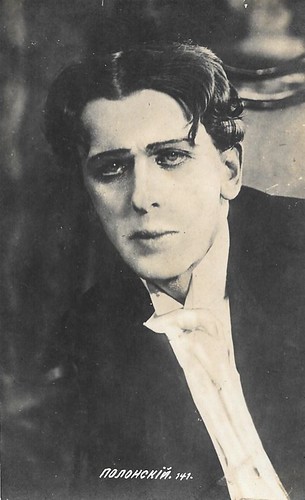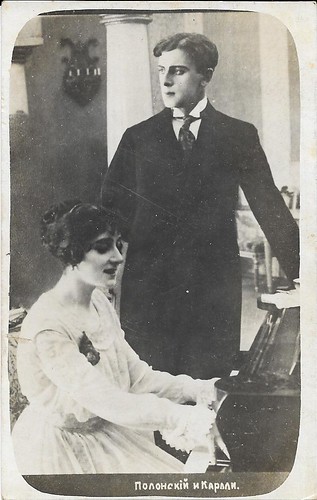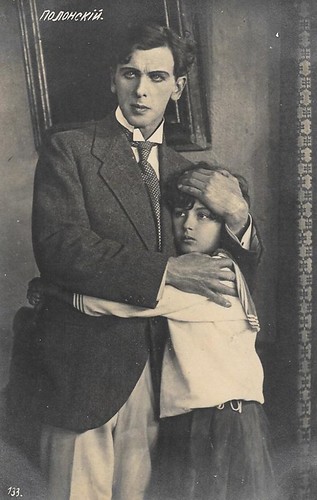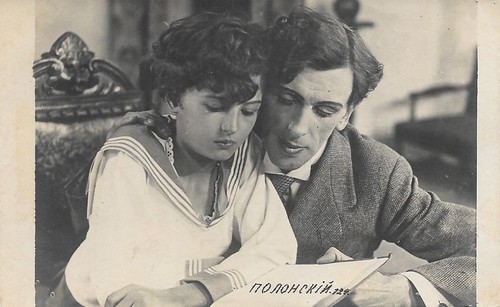Vitold Polonsky (1879-1919) was one of the most popular actors in pre-Revolutionary Russian cinema. He played several hero-lover roles in silent dramas by Yevgeni Bauer and Pyotr Chardynin.
![Vitold Polonsky]()
Russian postcard. Collection: Didier Hanson.
![Vitold Polonsky]()
Russian postcard. Collection: Didier Hanson.
Vitold Alfonsovich Polonsky (Russian: Витольд Альфонсович Полонский) was born in Moscow in the Russian Empire in 1879.
The young Polonsky took drama courses in the Moscow theatre school, and graduated in 1907. He acted in the Maly Theatre in Moscow until 1916.
His first film role was Prince Andrey Bolkonsky opposite Vera Karalli in Natasha Rostova (Pyotr Chardynin, 1915) based on the novel by Leo Tolstoy. He also appeared opposite the other diva of the Russian silent cinema, Vera Kholodnaya, in Pesn torzhestvuyushchey lyubvi/Song of Triumphant Love (Yevgeni Bauer, 1915).
He played several hero-lover roles including Andrey Bargov in Posle smerti/After Death (Yevgeni Bauer, 1915); Prince Baratynsky in Zhizn za zhizn/A Life for a Life (Yevgeni Bauer, 1916); and Lanin in U kamina/By The Fireplace (Pyotr Chardynin, 1917). Polonsky became one of the most popular actors in pre-Revolutionary Russian cinema.
One of the most famous films of the era is the silent drama Molchi, grust... molchi/Be silent, sorrow ... be silent or Still, Sadness ... Still ... (Pyotr Chardynin, 1918) with a star-studded cast including Vera Kholodnaya, Ossip Runitsch, Vladimir Maksimov and Polonsky. This film consisted of two parts, but the first (44 minutes in length) survives.
![Vitold Polonsky, Vera Karalli]()
Russian postcard. Collection: Didier Hanson. Photo: publicity still for Vozmezdie/Retribution (Yevgeni Bauer, 1916) with Vera Kholodnaya.
![Vitold Polonsky]()
Russian postcard, no. 133. Collection: Didier Hanson.
Vitold Polonsky was married twice. His first wife was the Maly Theatre actress Vera Nikolaevna Pashennaya, who became a National Artist of the USSR, a State Laureate and Lenin Prize winner. They had one daughter, Irina Polonskaya.
His second wife was Maly Theatre actress Olga Gladkova. They had one daughter, Veronika Polonskaya, who also became an actress.
In the summer of 1918, the film director Pyotr Chardynin and the Moscow cinema entrepreneur Dmitry Kharitonov requested the State Commissar for Education, Lunacharsky, to aid a group of cinema workers to travel to Odessa to film. They received a permit, and the group travelled to Odessa. Polonsky was part of the group along with Vera Kholodnaya and Ivan Mozzukhin.
In 1918, he directed the film Pesn lyubvi nedopetaya/Love Song Nedopetaya (1918) together with Lev Kuleshov. In November 1918, however, Odessa was occupied by the Entente forces (the Allies of World War I).
A few months later, in January 1919, Vitold Polonsky died from food poisoning.
![Vitold Polonsky]()
Russian postcard, no. 124. Collection: Didier Hanson.
![Lidia Ryndina, Vera Karalli, Vitold Polonsky]()
Russian postcard. Collection: Didier Hanson. Photo: publicity still for Vozmezdie/Retribution (1916, Yevgeni Bauer) with Lidia Ryndina and Vera Karalli.
![Vera Kholodnaya and Vitold Polonsky]()
Russian postcard with Vera Kholodnaya. Collection: Didier Hanson.
Sources: Wikipedia and IMDb.

Russian postcard. Collection: Didier Hanson.

Russian postcard. Collection: Didier Hanson.
Hero-lover Roles
Vitold Alfonsovich Polonsky (Russian: Витольд Альфонсович Полонский) was born in Moscow in the Russian Empire in 1879.
The young Polonsky took drama courses in the Moscow theatre school, and graduated in 1907. He acted in the Maly Theatre in Moscow until 1916.
His first film role was Prince Andrey Bolkonsky opposite Vera Karalli in Natasha Rostova (Pyotr Chardynin, 1915) based on the novel by Leo Tolstoy. He also appeared opposite the other diva of the Russian silent cinema, Vera Kholodnaya, in Pesn torzhestvuyushchey lyubvi/Song of Triumphant Love (Yevgeni Bauer, 1915).
He played several hero-lover roles including Andrey Bargov in Posle smerti/After Death (Yevgeni Bauer, 1915); Prince Baratynsky in Zhizn za zhizn/A Life for a Life (Yevgeni Bauer, 1916); and Lanin in U kamina/By The Fireplace (Pyotr Chardynin, 1917). Polonsky became one of the most popular actors in pre-Revolutionary Russian cinema.
One of the most famous films of the era is the silent drama Molchi, grust... molchi/Be silent, sorrow ... be silent or Still, Sadness ... Still ... (Pyotr Chardynin, 1918) with a star-studded cast including Vera Kholodnaya, Ossip Runitsch, Vladimir Maksimov and Polonsky. This film consisted of two parts, but the first (44 minutes in length) survives.

Russian postcard. Collection: Didier Hanson. Photo: publicity still for Vozmezdie/Retribution (Yevgeni Bauer, 1916) with Vera Kholodnaya.

Russian postcard, no. 133. Collection: Didier Hanson.
Food poisoning
Vitold Polonsky was married twice. His first wife was the Maly Theatre actress Vera Nikolaevna Pashennaya, who became a National Artist of the USSR, a State Laureate and Lenin Prize winner. They had one daughter, Irina Polonskaya.
His second wife was Maly Theatre actress Olga Gladkova. They had one daughter, Veronika Polonskaya, who also became an actress.
In the summer of 1918, the film director Pyotr Chardynin and the Moscow cinema entrepreneur Dmitry Kharitonov requested the State Commissar for Education, Lunacharsky, to aid a group of cinema workers to travel to Odessa to film. They received a permit, and the group travelled to Odessa. Polonsky was part of the group along with Vera Kholodnaya and Ivan Mozzukhin.
In 1918, he directed the film Pesn lyubvi nedopetaya/Love Song Nedopetaya (1918) together with Lev Kuleshov. In November 1918, however, Odessa was occupied by the Entente forces (the Allies of World War I).
A few months later, in January 1919, Vitold Polonsky died from food poisoning.

Russian postcard, no. 124. Collection: Didier Hanson.

Russian postcard. Collection: Didier Hanson. Photo: publicity still for Vozmezdie/Retribution (1916, Yevgeni Bauer) with Lidia Ryndina and Vera Karalli.

Russian postcard with Vera Kholodnaya. Collection: Didier Hanson.
Sources: Wikipedia and IMDb.


